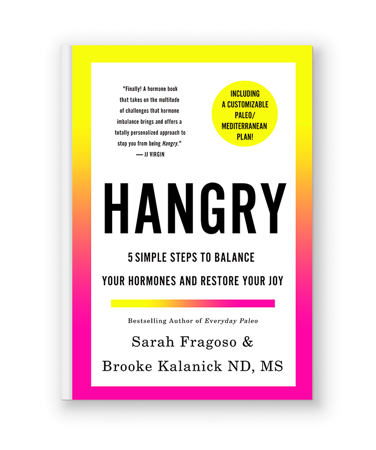
Your thyroid – the butterfly shaped gland that sits just above your collar bone – is a little powerhouse that fuels metabolism from brain to bone and everything in between. Every cell in your body needs thyroid hormones and you’re right to want to support it.
Unfortunately there are a slew of “thyroid diet” myths steering you way off course. When you suffer from low thyroid (hypothyroidism), everything slows down. You’re tired, bloated, constipated, your skin is dry, your hair falls out, you can’t shed weight and live in a cloud of brain fog.
While there are several causes for hypothyroidism, it is estimated that nearly 90% is due to an autoimmune attack on the thyroid gland (known as Hashimoto’s). Since this is the cause of the vast majority of low thyroid in women living in the Western World, when it comes to nutritional thyroid support, you need to focus on quieting this immune attack.
Get you FREE copy of my Guide To Lab Testing & Your Hormones
This guide covers hormonal testing and thyroid patterns and will show you how to suss out the Hormonal Dealbreakers of inflammation, anemia and blood sugar problems.
Get Your Free Lab Guide HereBut sadly popular advice from decades ago still spouts: Put down the broccoli! Gluten avoidance only matters if you have Celiac. And bring on the iodine. When I first graduated from naturopathic medical school, this was the advice I espoused as well. This was before I really understood Hashimoto’s and autoimmunity and needless to say, a lot of my patients weren’t getting much better. But I know much better now – and so should you, so let’s bust the three most egregious thyroid nutrition myths.
Myth #1 Broccoli Shuts Down Your Thyroid
As you adjust your diet for better thyroid health, understand where this “Broccoli is bad” notion comes from. The reason broccoli, and other Brassica veggies, such as Brussel sprouts, make the thyroid no-no list is because they contain compounds called goiterogens , which can affect thyroid’s ability to do its job.
Soy is also a goiterogen and makes the “bad for your thyroid” list. A goiterogen is simply a drug, chemical, or food compound that disrupts the normal production of thyroid hormone by blocking the thyroid gland from taking in iodine. The hormones your thyroid makes are made up of the amino acid tyrosine and 4 or 3 molecules of iodine (hence the thyroid hormone names of T4 and T3). If this iodine blocking process is going on in your thyroid, it will begin to swell, causing a non-toxic goiter (an enlarged thyroid gland that is swollen but not overproducing hormones).
This swelling from too many goiterogenic foods blocking iodine uptake happens as the pituitary bombards the thyroid with TSH (Thyroid Stimulating Hormone). It does this in attempt to get the thyroid gland to kick out more thyroid hormones. (What you’ll see on your bloodwork is high TSH and low thyroid hormones, T4 and T3.)
Here’s the kicker: if Brassica veggies or soy are the cause of hypothyroidism simply taking those foods out would ”fix” it. You’d feel better fairly quickly and your labs would return to normal.
But the main cause of hypothyroidism in the Western world is not goiterogens but is as I said above, an immune system attack on the thyroid (aka Hashimoto’s). Overtime this attack hinders the thyroid’s ability to do its job making you hypothyroid – but not because of low iodine intake but because of tissue destruction. It’s important to know why you have hypothyroidism.
If it is Hashimoto’s, skipping Brassica veggies can cause you to miss out on some great cancer fighting, antioxidant boosting, estrogen detoxing, high fiber powerfoods… and do little to improve your thyroid health. Besides, most of us couldn’t possibly eat enough broccoli to induce thyroid problems.
Order Hangry right now!
If you’ve ever felt like a Hangry B*tch and are ready to balance your hormones and restore your joy in just 5 simple steps then Hangry is for you!
GET YOUR COPY NOW
Soy, on the other hand, could possibly cause thyroid problems because it is so ubiquitous in our modern diet and can be in high concentrations in vegetarian or vegen diets for sure. The moral of this goiterogen story is that it’s unlikely that Brassica veggies are significantly hindering your thyroid and if you have Hashimoto’s, getting that immune system under control is job one – not curtailing your cauliflower intake.
However, cooking does destroy most of the goiterogens in these foods, so more cooked vs. raw is a reasonable strategy to employ for anyone.
FYI: Vegetables in the Brassica family: broccoli, cabbage, bok choy, Brussels sprouts, canola, cauliflower, collard greens, kale, kohlrabi, mizuno, mustard greens, rapeseed, rapini, rutabagas, tatsoi and turnips.
Myth #2 I Don’t Have to Be Gluten Free If I Have Hypothyroidism
OK, we’ve let Brussel sprouts off the hook but what about the bagel?
When you realize that the vast majority of hypothyroidism is autoimmune, then foods that fire up our immune system become important to avoid. The last thing we want to do is poke the bear with a slice of bread. But why is gluten such a problem?
The wheat/gluten we eat now is actually a lot different from what our parents and grandparents ate. Homegrown American gluten is a completely foreign molecule that our immune system sees as very foreign, much like it reacts to a common cold virus – for many, but not all people. And, it’s complicated…
Here’s a few specific ways gluten is firing up our immune system:
- In order to make gluten mix well with other ingredients, food manufacturers “deaminate” it. This chemical process makes the gluten molecules water soluble in order to make processed, packaged foods (meaning anything you buy in a box or bag from ketchup to cookies). However, this also creates a molecule that is much more reactive that our immune system reacts to even more than just plain gluten.
- We grow and farm massive amounts of wheat and it’s stored in large bins for long periods of time, allowing mold to act on it and create little immune system aggravators called enterotoxins.
- Many of us have “intestinal permeability”, aka a “leaky gut.” A leaky gut is caused by inflammation in the gut. Swelling in the cells of our intestines damages the junctions between the cells allowing larger proteins to “leak” through. Normally only small things pass through such as a a vitamin, or an individual molecule of glucose or one single amino acid (not a whole protein). When whole proteins end up in our blood stream, our immune system sees them and then here comes the immune system saying, “Who the heck are you?” and trouble ensues. We can get a leaky gut from years of a bad diet, various medications, having hypothyroidism, being under high stress, eating foods that we are sensitive to, taking antibiotics or birth control pills or doing anything that disrupts the delicate balance of bacteria in our gut.
If you find you’ve become increasingly more sensitive to foods, this may be an issue for you. Don’t fall into the, “but I don’t get a belly ache when I eat bread or pasta, so gluten is no biggie for me” trap. About 60 percent of people that react to gluten have ZERO digestive symptoms.
Reaction to this inflammatory food can show up as anxiety, depression, fatigue, eczema, acne, blood sugar problems and female hormone imbalances. So no, not every one in the world needs to avoid gluten.
But….if you have an immune systemproblem, you may be one of the ones that has a harder time with our modern gluten and it’s derivatives. Remember my loves with Hashimoto’s, you’re oh so special 🙂 We have to treat you that way, what works for most doesn’t work for you – but you already knew that right?
Myth #3 Bring On The Iodine! Then Load ‘Em Up With Tyrosine
This is among the most controversial topics in thyroid health: to iodine or not to iodine. Iodine is a component of thyroid hormone, meaning it’s essential to have iodine in order to have good thyroid output.
However, the main issue in 90% of cases of hypothyroidism in the US is an immune system attack on the thyroid, not iodine deficiency. In your thyroid gland, an enzyme called TPO (thyroid peroxidase) makes your thyroid hormones. It is this enzyme that is often attacked in Hashimoto’s.
When we dump a bunch of iodine into the system, our body will make more of this enzyme and it will go to work. Unfortunately, all that TPO activity can also kickstart an immune system attack in people with Hashimoto’s.
And remember with each “attack” the Hashimoto’s patient loses a little more thyroid function (translation: they need more and more medication over time as they continually lose thyroid tissue from these attacks.) So yes, many Americans are deficient in iodine (we’re all also deficient in magnesium, zinc and a whole lot of other minerals as well) however, if the cause of your hypothyroidism is Hashimoto’s you shouldn’t start adding supplemental doses of iodine to your regimen.
Do some of us need iodine? Yes, but it’s wise to know your autoimmune status first and respect your Hashimoto’s diagnosis. And perhaps the best advice here is simply to work with a qualified health care provider well-versed in supplements, thyroid and autoimmune concerns before going for a shopping spree at your local health food store. Fix the immune system first, then explore iodine therapy if you are deficient but only under guidance.
Ok, now tyrosine.
When a patient begins to take tyrosine they often feel better – isn’t that what we’re after? Well, yes, but they probably aren’t feeling better because their thyroid function has improved.
We do need tyrosine to make thyroid hormone but we also need it for adrenaline and dopamine production – those also make us feel great. Our adrenals are responsible for our adrenaline production and this hormone is so vital to survival that it takes priority – it snatches up the tyrosine straight away.
Adrenaline allows us to not pass out when we stand up and is responsible for that immediate reaction to move out of the way of an oncoming car. This is all good stuff, but it’s not thyroid related.
Many of you – especially those with low thyroid production – have low-functioning or mal-functioning adrenal/brain physiology (know as the HPA axis – hypothalamus pituitary adrenal axis) and this flood of tyrosine into the system boosts adrenaline and you’ll feel much more alert, have better energy and better concentration.
Order Hangry right now!
If you’ve ever felt like a Hangry B*tch and are ready to balance your hormones and restore your joy in just 5 simple steps then Hangry is for you!
GET YOUR COPY NOW
This is all good stuff – and we probably needed this adrenal support. But we mistake this boost in energy as having improved thyroid function. Adding tyrosine to a thyroid support regimen is not a terrible idea, but it gives us a false sense of improvement in thyroid output and what’s more, if you’re highly stressed throwing more adrenaline fueling nutrients into the mix may make adrenal issues worse – not better.
Wondering how your adrenals and other hormones are faring? Take my free Metabolic Resistance Quiz on my homepage.
So what are we to do?
First, if you are concerned about your thyroid or have hypothyroidism but do not know if it’s autoimmune, get it checked out (ask for TG and TPO antibodies). If you do have Hashimoto’s and have been sweating the Brussel sprouts, relax but do take a good look at going gluten free for the long haul. There is simply scads of research to support this connection between gluten and Hashimoto’s, but if you need to see it on paper by all means get adequately tested. More on that here.
Lifestyle changes such as this take practice and commitment, but it is worth it – and it does get easier.
Finally, if you’re thinking of supplementing with herbs and nutrients to support your thyroid and have autoimmunity of any sort, consider working with someone who can help you with a safe, effective regimen. As I always say, with autoimmunity you are in a special class and the standard advice isn’t always safe for you – even when that advice is “correct”. You’re special 🙂
